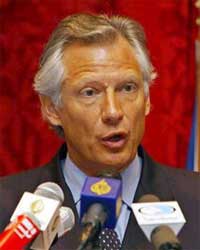|
Iran's Nuclear Standoff Heats Up
 |
|
"The resumption is irreversible," Aghamohammadi said. (Reuters)
|
TEHRAN,
August 2, 2005 (IslamOnline.net & News Agencies) – Iran's
nuclear standoff with the European Union and the United States took a
dangerous turn Tuesday, August 2, with the Islamic republic insisting
its decision to resume activities at a sensitive nuclear plant was
irreversible, drawing warnings from Europe's big three and threats
from Washington.
"The
political decision has been taken. We have handed over the letter to
the IAEA (International Atomic Energy Agency). The resumption is
irreversible," Supreme National Security Council spokesman Ali
Aghamohammadi told Reuters.
"I
deny reports of any delay," he added.
Iran
said it had received no response from the European Union to its offer
of new talks by the deadline it set of 07"30 GMT Monday, and had
told the UN's nuclear watchdog that it would break the agency's seals
on equipment at a uranium conversion plant near the central city of
Esfahan and resume work there.
Aghamohammadi
did not say the Iranians had actually broken the seals placed at the
plant by UN inspectors -- which would be a more decisive defiance.
The
conversion plant turns uranium ore into gas. The gas is then enriched
into fuel that could be used either in power stations or to make
nuclear weapons.
Iran
has always defended itself as having a right to develop peaceful
atomic technology.
Threats
 |
|
De Villepin threatened to refer the issue to the UN Security Council if Tehran maintained its reluctant stance.
|
On
the other hand, French Prime Minister Dominique de Villepin said
Tuesday Iran must live up to its commitment with the EU or face UN
Security Council retribution, reported Agence France-Presse (AFP).
"Iran
must honor the commitments it has made. These commitments are
commitments suspending all activity, conversion, treatment and
enrichment of uranium," Villepin told Europe 1 radio.
If
Tehran refuses, "the international community will be forced to
draw up consequences...with consensus, with dialogue," he said.
"Will
the Security Council have to be called on if Iran refuses to
comply?"
His
Foreign Minister Philippe Douste-Blazy said that Iran's decision may
spark "a major international crisis."
"The
Iran matter seems very serious to me -- it may trigger a major
international crisis because, if Iran doesn't go back on its decision,
then Iran will be, I would say, in a purely unilateral position,"
he told reporters Tuesday after a cabinet meeting chaired by President
Jacques Chirac.
In
the United States, White House spokesman Scott McClellan said if Iran
restarted activities at the Esfahan plant "we would have to look
to the Security Council".
The
so-called EU-3 of Britain, France and Germany have been trying to
mediate between Tehran and Washington, which insists Iran is trying to
produce nuclear weapons.
The
big three have been due to send Tehran a package of proposals by early
this month for nuclear, economic and political incentives provided
Iran renounces nuclear enrichment-related activities.
Some
EU officials speculated Iran might be creating a mini-crisis that
President-elect Mahmoud Ahmadinejad could defuse by calling at his
inauguration Saturday, August 6, for more time for negotiation.
This
could make him appear statesmanlike and soften his image as an
anti-Western hardliner.
10
Years Away
But
in another sign the issue may be heading to more escalation, The
Washington Post said Tuesday, quoting US officials with access to
a new intelligence review, that Iran is some 10 years away from
manufacturing highly enriched uranium to make a nuclear device.
Ordered
by the National Intelligence Council in January, the National
Intelligence Estimate on Iran doubles the amount of time the White
House believes Iran is away from building a nuclear weapon from five
years in the previous estimate in 2001, the daily said.
The
estimate, designed to alert the US president to national security
developments, said there were credible indicators that Iran's military
was conducting clandestine work, but nothing to indicate they were
related to a nuclear weapons program, according to sources familiar
with the report.
The
report also expresses uncertainty about whether Iran's leaders have
made a decision to build a nuclear arsenal, although it agrees that,
left to its own devices, Iran would pursue the nuclear weapons path.
On
Iran's political future, the US administration keeps "hoping the
mullahs will leave before Iran gets a nuclear weapons
capability," a US official familiar with the intelligence review
told the daily.
A
US bipartisan presidential panel reported in March that US
intelligence on Iran’s nuclear program is “inadequate” for
making firm judgments about the country’s weapons program.
|